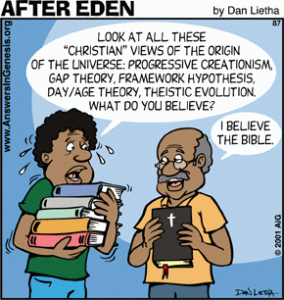I originally created this blog to chronicle my sabbatical during the summer of 2009. I am now rebooting it for occasional musings for the First Cutlerville CRC community and anyone else who might be interested. Like a question that I just received from a member (I will always keep your information private); but this is a general question that other members may be interested in as well.
The enquirer reports that some of his friends think that the Christian Reformed Church is either apathetic or antagonistic when it comes to reconciling science and the Christian faith. To which I reply, “Say what?!” The CRC has been a leader in tackling these issues, though there is considerable diversity of opinion among CRC members, and we have also seen significant controversy in the CRC over issues of how the Bible and science are related. Faculty members of Calvin College have often been at the forefront of investigating this relationship, and also, not surprisingly perhaps, at the forefront of the controversy as well. The CRC position on Creation and Science is summarized as follows:
All of life, including scientific endeavor, must be lived in obedience to God and in subjection to his Word. Therefore we encourage Christian scholarship that integrates faith and learning. The church does not impose an authorized interpretation of specific passages in Scripture; nor does it canonize certain scientific hypotheses. Instead, it insists that all theological interpretations and all scientific theories be subject to Scripture and the confessions. Humanity is created in the image of God; all theorizing that minimizes this fact and all theories of evolution that deny the creative activity of God are rejected.
In the 1980’s, a number of professors of the science department began investigating this relationship and published a number of books, which were met with a mixed reception. Astronomy Professor Howard J. Van Till published his book The Fourth Day in 1986 to considerable controversy, not least of all for an unfortunate analogy whereby he compared the Bible to a granola bar: one takes off the wrapper (which corresponds to the Biblical form and genre) and throws it away, and consumes the nourishing content, whatever that content may be. Thus the literary form of the early chapters of Genesis could be dispensed with in favor of the theological content.
The problem is that one cannot so easily separate form and content; the content is determined by and communicated through the form. The book was condemned by many who held to a young earth, literal six-day creation perspective as nothing but godless liberalism. It was embraced by many others as a shining example of Reformed engagement with the sciences. Others welcomed the idea of engaging the issue with rigorous thought, but were less satisfied with Van Till’s method and result. This was my assessment, and that of my seminary professors at the time. When I studied this book in the late 1980’s, I found that it was strong on astronomy (as far as I could tell) and exceptionally weak on theology, Biblical studies, and Biblical hermeneutics (the theory of interpretation). During those years I sometimes got the impression from a few scientists that, while one obviously needs a PhD to be an astronomer or physicist, any amateur can be a theologian. And today some scientists still presume to be able to dictate what is or is not possible theologically on the basis of the present state of scientific knowledge. The former Prof. Van Till, it seems, has moved beyond orthodox Christianity and appears to have embraced some kind of pantheism and/or deism. There is probably a lesson somewhere in that fact, though people will draw different conclusions as to what it means.
Another thing that is quite unhelpful is a lack of sensitivity among some Christian scientists in the manner that they raise these issues. I have encountered a few professors over the years who seemed to take an unholy pleasure in demolishing the childlike faith of their students under the guise of educating them. One, in Alberta, wrote of children’s education about the Bible and science: “The ark should float in Grade 1, and by the time students leave Grade 12 to meet me at university, someone has to have sunk the ark for them!” What he fails to notice is that this kind of cavalier approach might make a shipwreck of a young person’s faith. A similar lack of sensitivity was likely a factor in the latest outbreak of controversy at Calvin College a few years ago, when two professors, this time from the Religion department, suggested that science proves that there is no Adam or Eve. This resulted in the departure of one of the professors from the Calvin faculty. These are extremely sensitive and momentous issues, and one should employ maximal caution and humility in the claims one makes.
Without creating an ideological straitjacket, we also have to navigate what it means to have a confessional college that affirms the Reformed standards of unity. Our college is not a secular university; its constituency and its stakeholders are (at least to a large extent) the church. On the other hand, I largely appreciate the efforts of many scientists in the Reformed tradition who seek to integrate the faith into their discipline in a responsible and sensitive way. I very much appreciated the book Delight in Creation: Scientists Share Their Work With The Church, put out by the Center for Excellence in Preaching at Calvin Theological Seminary, part of a project they call The Ministry Theorem. I do not necessarily endorse everything in the book or on that site; but I endorse the project of keeping the conversation alive between scientists, on the one hand, and theologians and pastors on the other.
If the CRC has erred, it is not in being disengaged or hostile toward science. It would be in the opposite direction, of sometimes equating the results of science with general revelation–a serious mistake that elevates scientific findings and theories virtually to the level Holy Writ. (On this point, see the incisive critique of the 1991 synodical report on creation and science by Nicolaas Gootjes, “General Revelation and Science: Reflections on a Remark in Report 28,” Calvin Theological Journal 30 [1995]: 94-107). Our Kuyperian heritage, with all its robust intellectual richness and curiosity, has at times led us to be triumphalist about our endeavors, and to forget the noetic limits that result both from our creaturely finitude and human sin.
Thus one must be exceptionally cautious about pronouncing on the impossibility of an original human couple, or declaring doctrines such as original sin to be outmoded by recent science, as a retired CRC pastor recently claimed in The Banner. Unfortunately, this caution and humility seems to be lacking lately. At the same time, we in the CRC do have members who understand little about science and who do seem to be antagonistic toward science, often because of a certain political agenda. Thus we see members dogmatically deny the possibility that the millions of tons of fossil fuels we burn every day could have an effect on the climate, and instead desperately cling to those on the fringes of the scientific community who deny this effect. More humility all around would help.

Answers in Genesis mocks other views of the relationship of creation and science as un-Christian.
This does not mean that I am sympathetic to the so-called “Creation Science” phenomenon, which is really a kind of fringe conspiracy theory that denies the validity of mainstream science, claims human beings frolicked with dinosaurs, and tries to understand sedimentary rock formations with appeals to the biblical Flood; I am not. I think that movement (represented by organizations such as the Creation Research Institute and Answers in Genesis) represents a fatally flawed, and peculiarly North American, form of fundamentalism that is a rather different animal than Reformed orthodoxy. I would guess that the majority of CRC pastors and scientists would judge that it represents neither sound theology nor sound science. Whatever reservations I may have had with The Fourth Day, I was completely on board with the critiques by Calvin College science professors of the “Creation Science” perspective, which tends to label all differing views as apostate, and not authentically Christian, and engages in attacks and mischaracterizations of opposing views that are uncivil and intellectually dishonest (as in the comic to the right, which clearly implies that those who do not hold to a young earth creationist view do not believe the Bible). Let me be perfectly clear: this viewpoint does not represent the Reformed faith. It does not do justice to God’s Word in Scripture, because it fails to interpret it on its own terms and with appropriate attention to biblical genre, among other things. And, ultimately, it makes God out to be a liar. It undermines the veracity of God (i.e. God’s truthfulness) with such claims that God created the earth and the universe with the appearance of billions of years of age, when in fact the earth and the universe, they claim, is only six thousand years old. But why would God create an earth that appears to be that old, an antique reproduction rather than a genuine antique, so to speak? These claims are completely incoherent; they are not supported by the vast majority of scientists who are also Christians, and they have serious negative ramifications for the Christian doctrines of God and Scripture.
Leading Reformed theologians of a century ago, such as J. Gresham Machen and B. B. Warfield, did not hold these views. In fact, John Calvin himself, in his biblical commentaries, warned against reading the Bible as if it were an astronomy textbook. In his day, astronomers had discovered that some heavenly bodies such as planets were actually larger than the moon; yet the Bible describes the moon as the greater light and the stars as the lesser lights. Calvin does not smugly deny the findings of the astronomers and arrogantly declare, “Well, I believe the Bible.” Note his comments on these passages:
Calvin on Genesis 1:6 (the creation of the sky or firmament):
“For, to my mind, this is a certain principle, that nothing is here treated of but the visible form of the world. [i.e. how the world looks to us, from our perspective]. He who would learn astronomy, and other difficult arts, let him go elsewhere.”
Calvin on Genesis 1:16 (on the greater and lesser lights, i.e. moon, planets, stars):
“Moses wrote things in a popular style which all ordinary persons who have common sense are able to understand without additional instruction; but astronomers investigate with great labor whatever the wisdom of the human mind can comprehend. Nevertheless, this study is not to be rejected, nor this science to be condemned, because some frantic persons tend to boldly reject whatever is unknown to them.”
Calvin on Psalm 136:7 (He who made the great lights, his love endures forever):
“The Holy Spirit had no intention to teach astronomy; and, in presenting instruction meant to be shared by the simplest and most uneducated persons, he had Moses and the other Prophets use popular language…”
In other words, Calvin says, the Bible describes things as we experience them on earth, and its purpose is not to give us scientific information about the universe.
Tim Keller, the solidly Reformed pastor of Redeemer Presbyterian Church in New York City, has written a paper entitled: Creation, Evolution, and Christian Laypeople. It is well worth reading on this subject. And it is particularly relevant to the latest controversies regarding the historicity of Adam and Eve. Keller (as well as other scholars such as NT Wright) rightly warn against mythologizing everything the Bible says about the origins of humanity. His conclusion (which also represents the mainstream of the CRC) is sober and balanced: “Christians who are seeking to correlate Scripture and science must be a ‘bigger tent’ than either the anti-scientific religionists or the anti-religious scientists.”

